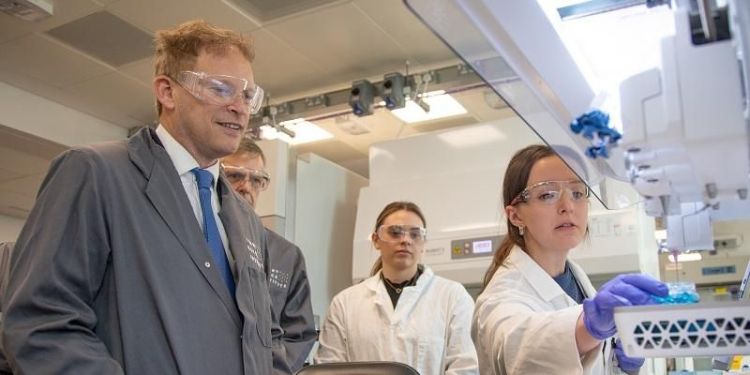New materials to drive UK economic growth

The Government has announced a £95 million boost to develop the new materials of the future through research at the Henry Royce Institute, a consortium of nine institutions including Leeds.
Business Secretary Grant Shapps said: “R&D investment is a critical way to turbocharge Britain’s growth.
“Growing an economy fit for the future means harnessing the full potential of advanced materials, making science fiction a reality by supporting projects from regenerative medicine to recycling robots right across the country.
“Today’s £95m investment will do just that, bringing together the brightest minds across our businesses and institutions to help future-proof sectors from healthcare to nuclear energy.”
The Henry Royce Institute was formed in 2015, with Leeds as one of the founding partners. To date, the Institute has worked with 295 small to medium sized businesses and facilitated 350 collaborations between academics and industry.
Research at the Institute focuses on the way existing materials can be adapted and improved so they work more effectively, and on developing entirely new materials. The UK is a world leader in research into advanced materials, and it is estimated that economic activity linked to advanced materials contributes £14.4 billion in value added to the UK economy.
Atoms to Devices
Leeds is leading the Royce Institute’s ‘Atoms to Devices’ research area with Cambridge, Imperial College London and Manchester. By manipulating individual atoms, scientistst and technologists are creating new electrical and optical materials and devices that will support the UK’s transition to net zero, lead to a sustainable society, and transform future healthcare.
At Leeds, Royce activities are centered around the new £96M Sir William Henry Bragg Building, which provides access to a breadth of state-of-the-art equipment for the fabrication and analysis of materials.
Professor Giles Davies, Deputy Executive Dean of the Faculty of Engineering and Physical Sciences and Partner Lead for the Royce Institute, said: “It is fantastic that the Government is investing in materials science and engineering.
“By understanding how materials work at the atomic level, we see how we can intervene to make them more effective or to design completely new and innovative materials which will help solve some of the big problems facing society, from radical new approaches to designing our electronics for energy efficiency to finding better ways to diagnose disease.”
Developing and enhancing new materials
At Leeds, materials research is truly interdisciplinary, with engineers, physical scientists, biologists and medics working side-by-side to make a difference to society globally.
For Professor Edmund Linfield, who leads the Royce Institute ‘Atoms to Devices’ research theme at Leeds, the interdisciplinary approach plays a key role in developing the vital high-level skills that are necessary if the UK is to be a world leader in advanced materials.
He added: “The use of new and advanced materials is critical for the success of UK industry. Sitting alongside the research that we do is the training of technologists who can exploit the new innovations and processes that will be coming up.
“We also see the real importance of communicating the excitement of materials, science and engineering to the general public, and explaining the vital work we do. In particular, we have worked with schools to inspire the next generations of researchers and engineers, and ensure we can attract the best people from whatever their backgrounds.”
Stephen Phipson CBE, Chief Executive of MakeUK, a group which represents British manufacturers, said: “This is a welcome announcement which recognises the world class research which takes place at this facility.
“If we are to maintain the UK’s position as a leader in research and development together with advanced manufacturing and materials, then facilities like this should be at the forefront of industrial strategy.”
The research funding to the Royce Institute is being allocated through the Engineering and Physical Sciences Research Council (EPSRC).
Executive Chair Professor Dame Lynn Gladden said: “Advanced materials are crucial to driving growth across our key industries, from energy and transport to health, and ensuring they are sustainable for the future.
“This funding will build on the success of the Henry Royce Institute so far, to unleash the potential of this transformative technology for the benefit of the economy and the environment.”
The partner organisations in the Royce Institute are: the Universities of Leeds, Sheffield, Manchester, Liverpool, Cambridge, Oxford and Imperial College London as well as UKAEA and National Nuclear Laboratory. There are two associate partners: the Universities of Cranfield and Strathclyde.
Further information
For more details, please contact David Lewis in the press office at the University of Leeds: d.lewis@leeds.ac.uk
Top image shows Mr Shapps being shown facilities at the Henry Royce Instuitute in Manchester.




